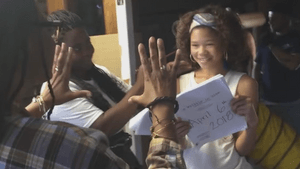Stay in the Loop
BSR publishes on a weekly schedule, with an email newsletter every Wednesday and Thursday morning. There’s no paywall, and subscribing is always free.
Helping Hollywood help itself
Black Hollywood is (and has been) ready for its closeup

Would Chris Gees have worked on A Wrinkle in Time if not for the #OscarsSoWhite movement? Hard to say. This Philadelphia-born, Los Angeles-based hair and makeup artist had already styled Beyoncé’s dancers for both the Video Music Awards and the Grammys.
His star has been on the rise for years. Still, I can’t help thinking that opportunities for people of color hoping for high-profile jobs have increased since social media called out the Academy for its far-too-monochromatic nominees a few years ago.
Lending a hand
As I write this, Black Panther is riding a well-earned wave of both critical and audience acclaim. I saw the movie twice during its opening weekend (I celebrated my birthday to the fullest) and can confirm the film’s excellence. I know performances in action movies are never nominated for anything — which strikes me as unfair — but maybe an exception will (and should) be made in this case.
Kudos to the cast; to their 31-year-old director, Ryan Coogler, who co-wrote the screenplay; and to the African-American women who make Black Panther so visually stunning, including Ruth E. Carter (costume design) and Hannah Beachler (production design).
I’m not offering this praise because I’m caught up in the hype or blinded by racial pride. My point is — and should be — fairly obvious: when given a chance, people of African descent can handle all kinds of endeavors, at the highest levels. The problem is finding gatekeepers who will allow us the opportunity.
A personal illustration of this dilemma occurred shortly after I returned from the African-American Art Song Alliance conference last year. I felt excited about getting a group of top-notch classical performers — who, besides me, were all white — to play music by some of the conference's impressive composers.
I knew nobody else would raise this idea, even though one of our concerts was scheduled for February: Black History Month. (Seriously, though, can we get programmed in March, too? Or November?) In the end, we commissioned a piece by an African-American composer who is a faculty member at the school that sponsored the concerts. None of the composers I suggested were represented. It was okay in a way, since I really liked the piece we performed, but also speaks to the difficulty of truly gaining the power to open doors for other people of color.
{photo_2}
Black Panther proved that the world was ready not only to embrace but to get very excited about a superhero movie featuring a cast predominantly of African descent. If A Wrinkle in Time, helmed by Ava DuVernay (who passed on Black Panther, incidentally) receives similar acclaim, will this result in a sea change? I don’t know.
The color of money
In the wake of the success of Chimamanda Ngozi Adichie’s Americanah (which will soon be a movie, starring — who else — Lupita Nyong’o), novels by African authors, particularly women, are hot properties. Whether or not the fascination will last is anybody’s guess. Still, if the mainstream (translation: people who aren’t black) starts buying books by Africans, somebody is going to make movies out of them.
While Steven Spielberg can pretty much direct anything he wants, I think the climate that has resulted from #OscarsSoWhite makes it unlikely that the majority of these hypothetical films would be attached to white directors. And since Ava DuVernay and Ryan Coogler can’t direct everything, that means more opportunities for gifted people who have, so far, been underemployed.
The next challenge, however, will be equal pay. Hollywood is exactly like the rest of the United States: people of color typically earn less, even if they’re just as good. A case in point is Viola Davis, who mentioned that even though she is an Emmy-, Tony-, and Oscar-winning actress who attended Juilliard (I was there!) and is called “the Black Meryl Streep,” she has to demand pay parity. She called on white celebrities — such as fellow Juilliard alum Jessica Chastain, who advocated for Octavia Spencer's quintuple pay raise in their next film — to "stand in solidarity" with their colleagues of color.

Still, the color executives value most is green. If the public will pay for a product, studio wallets will open. (For an article about the financial rewards of embracing diversity, click here.)
When a director of color is entrusted with a huge project such as A Wrinkle in Time, they have an opportunity to choose department heads, and those department heads can then choose their teams. Chris Gees ended up working on such a hugely anticipated movie because Kim Kimble, who includes Beyoncé among her clientele, met him at the Video Music Awards and brought him on board.
In an interview, Chris notes that the number of people of color in IATSE Local 706, the union local that represents makeup artists and hairstylists who work on major motion pictures, is still few, but there seems to be a “changing of the guard.” He adds, “Even programming like This Is Us has opened the door for more diversity in the vanity department (i.e., hair and makeup) because of more actors wearing natural ethnic styles. I’m so excited to be a part of this movement.”
Some people of color won’t make the cut. But we at least deserve the opportunity to try.
Sign up for our newsletter
All of the week's new articles, all in one place. Sign up for the free weekly BSR newsletters, and don't miss a conversation.

 Maria Thompson Corley
Maria Thompson Corley